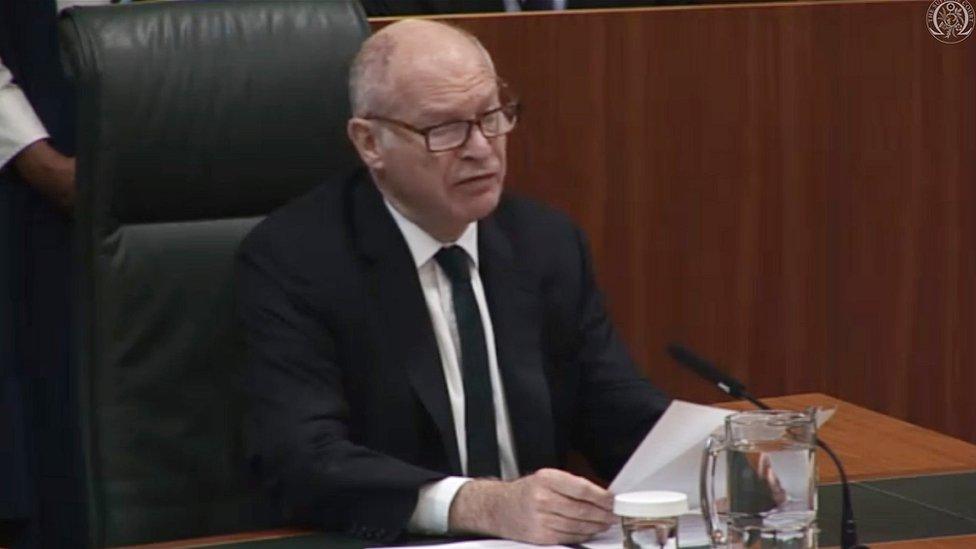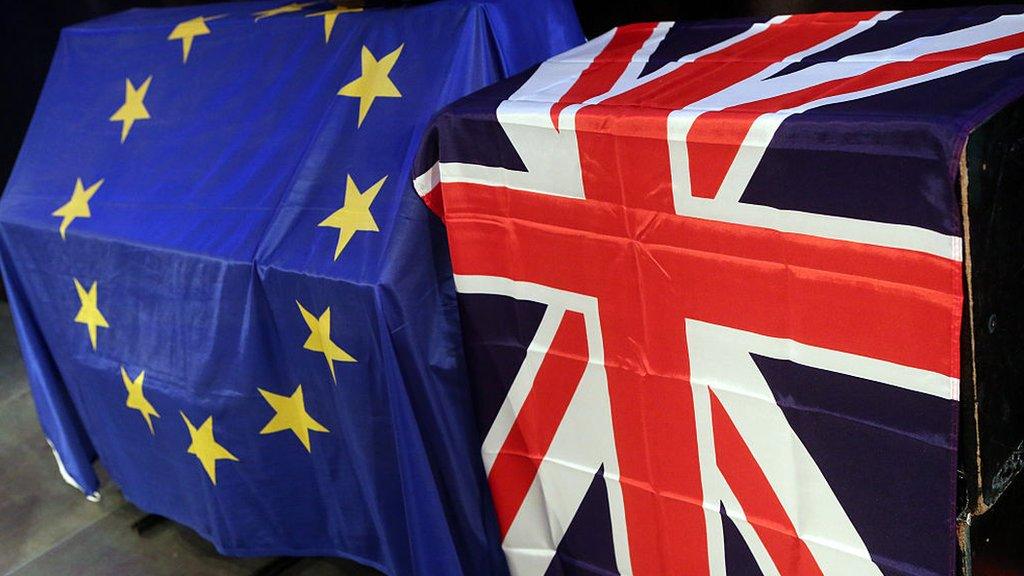Article 50 Bill: what happens next in Parliament
- Published
- comments

Lord Neuberger, President of the Supreme Court, announced that the government had lost its appeal against a ruling that the prime minister must seek MPs' approval to trigger the process of taking Britain out of the European Union
Some MPs are already talking about the impending Article 50 vote as their Iraq moment; a Commons vote of huge historic significance, complete (for some at least) with a gut-twisting clash between political principle and career survival.
The expectation is that the Leader of the House, David Lidington, will announce the timing for consideration of the Article 50 Bill mandated by the Supreme Court, at Commons Business Questions on Thursday.
The bill - likely to be no more than a few lines - could be published this week and debates could begin next week. (If no such announcement occurs, something has gone wrong behind the scenes).
To be sure, such a rapid process would amount to a telescoping of normal Commons rules, which require two weeks between the publication of a bill (its first reading, in parliamentary jargon) and the second reading debate. But that kind of thing happens all the time - and a simple motion to ignore the usual intervals would be agreed behind the scenes, in the so-called "usual channels" and then rubber-stamped by MPs.
The question then is not "will MPs block Brexit?" There is a clear Commons majority, and I doubt that much more than a hundred of the 650 MPs would be prepared to vote against the Article 50 Bill.
The real question is what amendments might be attempted.
There's been a certain amount of talk about the government creating an "unamendable" bill - a concept to be filed alongside unsinkable ships, foolproof precautions and no-iron shirts.
The bill will be very short and will have a very carefully-limited "scope" - which means that any amendments offered up will have to be very precisely worded. Deputy Speaker Lindsay Hoyle and the Commons clerks will doubtless spend many hours sifting through them, probably rejecting the vast majority.
But if a bill says anything, it must then be capable of being amended or of having new clauses tacked onto it.
But for that to happen in practice, some of the Conservatives' narrow Commons majority would have to flake off - quite a few, in fact, given that the eight DUP MPs, plus a number of pro-Brexit Labour MPs would probably oppose any amendment. And failure to back the government on this bill, of all bills, would be career-threatening for any Tory other than Ken Clarke.
Watching David Davis's Commons statement, it seems clear that the two main pressure points are both procedural.
A succession of rearguard Tory Remainers demanded a White Paper, external, a formal policy document, setting out the government's position. And in truth, it would not be a very big concession for the government to make - just turn the language of Theresa May's speech into officialese, and maybe stir in a couple of position papers already in circulation, and Hey Presto!
Offering a concession that did not really concede anything would, at least, provide MPs in pro-Remain constituencies with a fig leaf to shield them from their voters.
Then there's Labour's "meaningful vote" idea, trailed by their superlawyer Brexit spokesman, Keir Starmer.
This would require the government to give Parliament a vote on the Brexit terms, in time for the deal to be re-worked, if it was not approved. The thinking here is that MPs and peers might be confronted with a choice of approving whatever deal was put before them, or running out of time and seeing the UK drop off the fabled "cliff edge" into trading with the EU on World Trade Organisation terms - the default minimum, in the absence of a bespoke deal.
Again, most of the Opposition parties might back this, but it could not be passed unless a fair number of Conservatives were prepared to take the huge step of throwing their own party over.
When might the attempts be made? Expect the government to be extremely generous with debating time - there might even be a two-day second reading debate, which is an unheard-of luxury these days. There may well be an Opposition amendment at second reading, and if that failed, as it probably would, further amendments when the bill moves to detailed committee stage debate.
Because this is a constitutional measure this would be a committee of the whole House, and again the debate might be allowed several days. In effect, the government would be inviting its opponents to drone until they dropped, through the night if necessary, with tumbleweed blowing across the Chamber. All with the aim of ensuring that no-one could possibly say that they had curtailed discussion.
What about the House of Lords?
Then it's on to the Lords, external. There has been a certain amount of loose talk that europhile peers are lining up to block Brexit.
Few peers supported the Leave cause, but fewer still want to commit political suicide, and nothing would guarantee a determined drive to reform and reduce the House of Lords more effectively than a "Peers versus the People" battle over Brexit. (This was the unspoken thought behind the government's decision not to press on with clipping peers' wings after the Strathclyde Review, external, which followed their blocking of George Osborne's proposed cuts to tax credits - "we'll let you be, unless you really annoy us…")
I also suspect it would be very hard for peers to muster a majority for any wrecking amendments - although the Liberal Democrats (or most of them, anyway, because there are Lib Dem dissenters on this) might attempt a bit of theatre.
The key point is that Labour's leadership have pledged not to block Article 50 - and while some Labour peers might vote against, without organised Labour opposition there will be a comfortable majority for an Article 50 Bill in the Lords.
The other hazard is a filibuster - a barrage of amendments and long speeches, taking advantage of the much looser rules of the Lords - to draw out the debate for as long as possible. It could be done, theoretically, but I'm not sure what point would be made by game-playing of this kind. And, again, it might draw down the reforming wrath of the government.
So expect the Article 50 Bill to weather the storms ahead - but watch out for much more interesting action when the next big Brexit measure, the Great Repeal Bill, promised for the Queen's Speech in May, hoves into sight.
- Published30 December 2020

- Published28 March 2017

